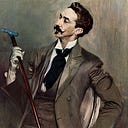The Art of Confinement? : J.K. Huysmans’ Against the Grain
On how a pandemic is taking me back to an infamous 19th century decadent novel….
April 2020, United States. Shops, restaurants, and parks are closed. State and city authorities across the nation impose curfews. People hoard cleaning supplies and toilet paper as they hear the news of a dangerous virus quickly spreading in all directions. Nearly all schools have chosen to finish off the current term remotely, through the internet. All you hear about everywhere in the media is related to this sudden confinement — this imperfect, collective effort to stop a pandemic from claiming more and more victims. Many are stressed to see their daily routines and social life disturbed by this, and for some the sudden alteration to these has had catastrophic financial consequences.
I had considered that making a connection between my field of study and the current social landscape was perhaps too much of a cliché right now. Every single media outlet has done the same lately. From a feminist website I have learned that domestic abuse cases are rising during the pandemic. From a queer one, that trans and gender nonconforming people waiting on medical procedures have seen delays. I even read a piece on a music criticism website about how the experimental music scene in Iran has been hit hard by the pandemic. It goes without saying that every single population has a story to tell during these times. What does a literary man have to say? Why even think of literature right now? (Or rather, how not to, with all this time spent inside?)
A much more fitting literary text to discuss would have been Albert Camus’ The Plague, a novel that more obviously parallels our environment of fear and uncertainty. Camus’ tale about a plague hitting Oran residents in different ways is certainly always worth a read, but the choice would’ve been too obvious. I will turn instead to J.-K. Huysmans’ naturalist masterpiece Against The Grain, which is oddly not that concerned with the outer world but still reminded me of what so many of us are currently experiencing.
In Against The Grain, there is no pandemic profoundly altering people’s way of life. There is, in fact, very little interest in the workings of society in this novel primarily dedicated to documenting the unusual taste of a pampered, weak French aristocrat. Nonetheless, that is indeed what I find compelling about such a text: the sincere, asphyxiating representation of the anxiety that comes from trying to find a source of entertainment during confinement.
Des Esseintes — the protagonist — has voluntarily escaped to an estate outside of Paris with just two servants and an array of objects that, he thinks, might bring some meaning to his life. The chapters of this novel feature, instead of a ‘plot’ in the traditional sense, a list of these objects, why they are important for Des Esseintes, and why they ultimately still failed to bring him that spiritual satisfaction he is seeking.
A chapter dedicated to his collection of Latin books, for example, shows us he values texts outside of the classical canon. He appreciates unusual Latin vocabulary, perverse subjects, and hidden histories related to the origins of Christianity found in authors such as Petronius and Apuleius. Experimental and bold texts are at the forefront also in a chapter dedicated to contemporary French literature, with the somber Baudelaire as a prominent reference point throughout the text. For the visual arts, he leans towards the eccentric and dark visuals of artists such as Gustave Moreau and Odilon Redon. Other sections have him document his favorite perfumes and candy. In an infamous scene, in fact, he attempts to find erotic satisfaction from eating candy. Academics to this day are still entertained by this bored aristocrat jumping from books to fragrances to snacks in a search for contentment.
At the end, Des Esseintes must face the sad truth: attempting to define himself in relation to his aesthetic tastes has not brought him what he is looking for. Inspired by the pessimism of German philosopher Arthur Schopenhauer, J.-K. Huysmans presents us the despair that comes from attempting to fill the void with hedonistic or self-growth activities. J.-K. Huysmans would later in life become a devout Catholic and would support the idea that a system of beliefs is necessary to fill that void.
The sudden change to our routines has many of us attempting similar (though definitely not at all analogous) journeys as the one the privileged, sickly Des Esseintes went through. When we must live isolated, inside our city apartments and far from our workplaces, we turn to art (in the form of books, music, and film) and to a range of sensations to keep us entertained and, perhaps, to discover what would be of us if we did not have our jobs and our public spaces to distract us a little from our aimless minds. Many of us are finding some momentary relief in the reading of books and watching of movies, but at some point exhaustion and frustration replace it. What to do, then, but wait?
The waiting has led to some interesting conclusions, particularly in regard to the authorities and their power to help people. Interesting talks regarding the urgent necessity to provide free housing, internet and an income to assure people’s survival are taking place. (And for some, too, perhaps existential awakenings regarding the need for religion or hope are taking place.) What did I learn from a book about a rather unlikeable, pretentious rich man in 19th century France? Well, first and foremost, that perhaps confronting one’s solitude is frustrating and painful, but can at least shed light on what we are — both as individuals and as a society.
